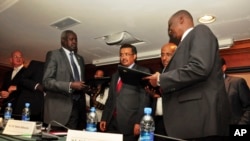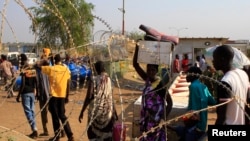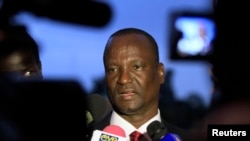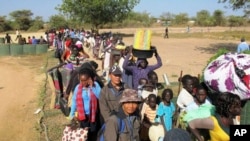ADDIS ABABA —
Negotiators for the South Sudan government and opposition forces signed two agreements Thursday to end nearly six weeks of conflict that have claimed thousands of lives and displaced more than half a million.
The agreements, which were signed in the Ethiopian capital, call for military action to cease immediately and for the release of 11 political leaders who were jailed when the conflict began on Dec. 15 to be expedited to allow them to play a key role in the young country's reconciliation process.
The agreements came after weeks of talks brokered by the East African bloc, the Intergovernmental Authority on Development (IGAD).
One of the terms of the cessation of hostilities agreement, which is set to take effect 24 hours after the signing ceremony, is that all forces and armed groups "invited by either side" be redeployed or "progressively withdrawn" from the "theater of operations."
Uganda sent troops to fight alongside the South Sudanese army during the conflict, which was touched off in mid-December by a gunbattle at army headquarters in Juba, the capital. President Salva Kiir said the Dec. 15 clashes were an attempted coup, led by his former vice president Riek Machar, who has denied the accusation.
The ceasefire agreement also calls for an end to "hostile propaganda" and attacks against civilians, and for pro- and anti-government forces to refrain from acts of violence including rape, torture, summary executions, mass displacements and the use of child soldiers.
Both sides have been accused of committing gross human rights violations.
Humanitarian corridors must be opened, and the hundreds of thousands who fled their homes must be given assistance to return to them, the agreement says. It also calls for South Sudanese leaders to facilitate the reunion of families separated during the fighting.
A team will be set up to monitor the ceasefire agreement and ensure that its terms are abided by. Called the Monitoring and Verification Team, it will report to IGAD.
The lead IGAD mediator at the peace negotiations, Ethiopian diplomat Seyoum Mesfin, urged the two sides to keep the momentum of the signing of the accords going and take steps to ensure that peace and reconciliation take root in South Sudan.
Both sides must “...implement any agreements that they signed, in good faith and with full commitment," he said.
They must also "begin to work towards rehabilitation and support the hundreds of thousands of internally displaced people and refugees," and "continue with political dialogue and work towards an all-inclusive national reconciliation," he said.
The pacts were signed for the government by Nhial Deng Nhial and Taban Deng Gai for the opposition.
The two sides had little to say to each other during the signing ceremony, which got under way several hours after it was supposed to.
But lead government negotiator Nhial expressed concern about whether the opposition would be able to get its fighters to respect the terms of the ceasefire.
"Given that the bulk of the rebel army is made up of civilians who are not subject to military discipline, orders to stop fighting may not be obeyed," Nhial said.
"This will certainly make a mockery of the agreement. We therefore urge IGAD and the broader international community to pay special attention to this problem," said Nhial.
Lead opposition negotiator Taban Deng Gai said the opposition did not initiate the violence.
“Our core goal has always been reforms, democratization of the political process within the SPLM party and peaceful transfer of power," said Gai.
Fighting in South Sudan broke out in mid-December between backers of President Salva Kiir and former vice president Riek Machar.
The next phase of the peace process between the South Sudanese government and the opposition is expected to start on February 7 and should include the participation of the 11 detainees.
U.S. President Barack Obama hailed the cessation of hostility agreement, calling it "a critical first step toward building a lasting peace" in South Sudan, and called on the young country's leaders to build on the momentum of the signing of the peace deal, and "fully and immediately implement the agreement and start an inclusive political dialogue to resolve the underlying causes of the conflict."
"The full participation of political detainees currently being held by the Government of South Sudan will be critical to those discussions, and we will continue to work to expedite their release," Obama said in a statement.
The U.S. president also called for those who are found to have committed atrocities during nearly six weeks of unrest in the country to be held accountable and vowed that the United States will remain a "steady partner" to "those working for a more peaceful, democratic, unified South Sudan."
State Department spokeswoman Marie Harf called the agreement "a critical first step toward building a lasting peace in South Sudan," but added that it was "only the beginning of a much longer process to resolve the underlying causes of the conflict, to foster reconciliation, and to hold accountable those who committed horrific abuses against the South Sudanese people."
U.N. Secretary General Ban Ki-moon welcomed the agreement and urged the two sides in the conflict to keep the momentum going with a "national political dialogue to reach a comprehensive peace agreement, with the participation of all South Sudanese political and civil society representatives, including the SPLM detainees."
The United Nations has provided shelter on its bases and in its compounds for some 70,000 people who fled towns and villages wracked by fighting in South Sudan. More than half a million people have been forced from their homes, including more than 100,000 people who have fled to neighboring countries including Uganda, Ethiopia and Sudan.
Although no death toll has been established for the violence in South Sudan, the United Nations Assistant Secretary General for Human Rights, Ivan Šimonović, said after a visit there last week that "many thousands" have died.
The agreements, which were signed in the Ethiopian capital, call for military action to cease immediately and for the release of 11 political leaders who were jailed when the conflict began on Dec. 15 to be expedited to allow them to play a key role in the young country's reconciliation process.
The agreements came after weeks of talks brokered by the East African bloc, the Intergovernmental Authority on Development (IGAD).
One of the terms of the cessation of hostilities agreement, which is set to take effect 24 hours after the signing ceremony, is that all forces and armed groups "invited by either side" be redeployed or "progressively withdrawn" from the "theater of operations."
Uganda sent troops to fight alongside the South Sudanese army during the conflict, which was touched off in mid-December by a gunbattle at army headquarters in Juba, the capital. President Salva Kiir said the Dec. 15 clashes were an attempted coup, led by his former vice president Riek Machar, who has denied the accusation.
The ceasefire agreement also calls for an end to "hostile propaganda" and attacks against civilians, and for pro- and anti-government forces to refrain from acts of violence including rape, torture, summary executions, mass displacements and the use of child soldiers.
Both sides have been accused of committing gross human rights violations.
Humanitarian corridors must be opened, and the hundreds of thousands who fled their homes must be given assistance to return to them, the agreement says. It also calls for South Sudanese leaders to facilitate the reunion of families separated during the fighting.
A team will be set up to monitor the ceasefire agreement and ensure that its terms are abided by. Called the Monitoring and Verification Team, it will report to IGAD.
The lead IGAD mediator at the peace negotiations, Ethiopian diplomat Seyoum Mesfin, urged the two sides to keep the momentum of the signing of the accords going and take steps to ensure that peace and reconciliation take root in South Sudan.
Both sides must “...implement any agreements that they signed, in good faith and with full commitment," he said.
They must also "begin to work towards rehabilitation and support the hundreds of thousands of internally displaced people and refugees," and "continue with political dialogue and work towards an all-inclusive national reconciliation," he said.
The pacts were signed for the government by Nhial Deng Nhial and Taban Deng Gai for the opposition.
The two sides had little to say to each other during the signing ceremony, which got under way several hours after it was supposed to.
But lead government negotiator Nhial expressed concern about whether the opposition would be able to get its fighters to respect the terms of the ceasefire.
"Given that the bulk of the rebel army is made up of civilians who are not subject to military discipline, orders to stop fighting may not be obeyed," Nhial said.
"This will certainly make a mockery of the agreement. We therefore urge IGAD and the broader international community to pay special attention to this problem," said Nhial.
Lead opposition negotiator Taban Deng Gai said the opposition did not initiate the violence.
“Our core goal has always been reforms, democratization of the political process within the SPLM party and peaceful transfer of power," said Gai.
Fighting in South Sudan broke out in mid-December between backers of President Salva Kiir and former vice president Riek Machar.
The next phase of the peace process between the South Sudanese government and the opposition is expected to start on February 7 and should include the participation of the 11 detainees.
U.S., U.N. hail ceasefire deal
U.S. President Barack Obama hailed the cessation of hostility agreement, calling it "a critical first step toward building a lasting peace" in South Sudan, and called on the young country's leaders to build on the momentum of the signing of the peace deal, and "fully and immediately implement the agreement and start an inclusive political dialogue to resolve the underlying causes of the conflict."
"The full participation of political detainees currently being held by the Government of South Sudan will be critical to those discussions, and we will continue to work to expedite their release," Obama said in a statement.
The U.S. president also called for those who are found to have committed atrocities during nearly six weeks of unrest in the country to be held accountable and vowed that the United States will remain a "steady partner" to "those working for a more peaceful, democratic, unified South Sudan."
State Department spokeswoman Marie Harf called the agreement "a critical first step toward building a lasting peace in South Sudan," but added that it was "only the beginning of a much longer process to resolve the underlying causes of the conflict, to foster reconciliation, and to hold accountable those who committed horrific abuses against the South Sudanese people."
U.N. Secretary General Ban Ki-moon welcomed the agreement and urged the two sides in the conflict to keep the momentum going with a "national political dialogue to reach a comprehensive peace agreement, with the participation of all South Sudanese political and civil society representatives, including the SPLM detainees."
The United Nations has provided shelter on its bases and in its compounds for some 70,000 people who fled towns and villages wracked by fighting in South Sudan. More than half a million people have been forced from their homes, including more than 100,000 people who have fled to neighboring countries including Uganda, Ethiopia and Sudan.
Although no death toll has been established for the violence in South Sudan, the United Nations Assistant Secretary General for Human Rights, Ivan Šimonović, said after a visit there last week that "many thousands" have died.







